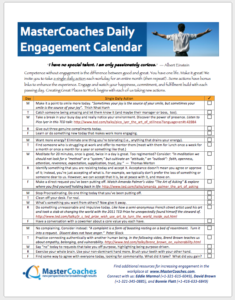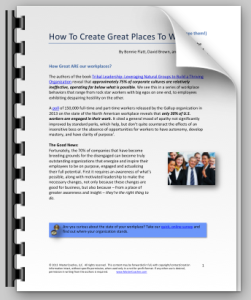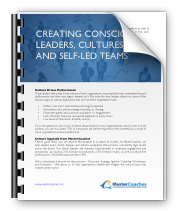Picture a senior executive in a company. This might be you. Or someone who works for you. Or your boss. And he or she is out having dinner with friends, relaxed and being candid. This is where my account of a real situation begins.
I was having dinner at a fine restaurant with my wife and I couldn’t help but overhear a conversation at the next table. It was a couple and a single male. The man looked to be in his late 50s, well dressed, distinguished. He was telling the couple, his friends, about his work. Apparently he was a senior executive who was sharing about finally “seeing the end in sight.” Most of his narrative was about his vesting in his company’s stock options, his good fortune, and eagerness to be across that finish line. There was some talk about the tools of his trade, but not one word about enjoying any of his day to day or any personal engagement whatsoever. The gist of it gave the distinct impression that his primary connection to his work was as a vehicle to get to the end when he could retire and finally enjoy the fruits of his labor.
I realize that I was filling in many blanks, but I’d be willing to wager that most others listening would have a similar impression. I wondered then what boss would be proud to have that be how their senior executives represented their relationship to their work. I also realized this wouldn’t strike most people as significant: a recent study by Gallup found that over 70% of the workforce in North America is disengaged from their work. But creating great places to work is what my partners and I are passionate about and I just couldn’t ignore the scenario. Now let’s turn this around: if you knew this person worked for a company you knew, would such a conversation influence how you felt about the company? Would you be more or less inclined to be their customer? Would you wish you worked in such a place?
My closest friend died suddenly of cancer when he was in his mid-50s, short of retiring. I learned first hand that tolerating your day to day in exchange for the years after retirement is a dubious proposition. Partly because the odds are you’ll have fewer good years left than the ones you tolerated. Partly because it’s just plain unnecessary and a waste of human potential and the joy of being alive.
Earlier I was coaching a client who was successful, but not satisfied. In my emails
I have signatures with quotes that randomly rotate. He told me what he wanted most was in one of those quotes:
“People say that what we’re all seeking is a meaning for life…I think that what we’re really seeking is an experience of being alive, so that our life experiences on the purely physical plane will have resonance within our innermost being and reality, so that we can actually feel the rapture of being alive.” Joseph Campbell
Could that be possible in the workplace? Hell yeah!
In an upcoming September post we will be sharing a free gift that will shed light on how you can have a great place to work that provides meaning, satisfaction, and leverages your potential and that of your team. You will also be given a tool to help you determine where your organization is along the great places to work continuum and what you could do to address your specific challenges.
Things you can do now to make work more meaningful and satisfying:
1. Discover your core values. Unlike non-core values, life doesn’t feel worth living if these values aren’t being honored. People quit jobs over these. Core values also make complex decisions much easier!
Example: Connection and Purpose are core values of mine. If I had a job that didn’t allow for me to have a sense of connection to something meaningful, including others, and a purpose that resonated for me, that job would not be sustainable. Contact us and we’ll send you a simple tool to help you discover your core values.
2. Assess your work environment. Do you have all the tools and resources you need to optimally do your job? If not, prioritize what you need, clarify why and how having these would produce specific benefits. Either make those changes now or request what you need, highlighting the benefits.
Example: A manager was tired of all the wasted time in unproductive meetings. He added up the collective salaries of the attendees, documented the outcomes of these meetings, and made a solid case for why these meetings should be eliminated or structured to be meaningful. Once the shock of the waste was digested the meetings were re-structured.
3. Find out the purpose of your company. Why does it exist? Hint: the answer is never making money (that’s an outcome). If the company has a vision or mission, is it being lived; could it be lived? What is the origin story of the company? Discover a purpose you can get behind and have that guide your actions in all you do there.
Example: At Brenthaven, one of our new favorite companies, their mission is “to design and build innovative, high quality cases that provide peace of mind for your digital lifestyle.” If you contact them to apply their lifetime guarantee to a product, any employee there is empowered to make it right, even if you have a 12 year old laptop bag and no receipt. Receiving the kinds of testimonials they get can only feel good.
In our last newsletter we talked about the value of an engaged workforce, including some sobering statistics and implications. Today we shared a real life example that is being played out in every town across North America. These aren’t just statistics, they’re your executives, co-workers, neighbors, or maybe even you.
- If you’re not as disturbed by that as we are, if you’re OK with work being nothing more than a means to an end, what we offer is probably not for you.
- If you do get it, but have come to the conclusion that a great place to work is a pipe dream (or as my brother once told me, “there’s a reason they call it work, stupid”), then we implore you to speak to us. It can and has been done.
- If you’re someone who gets it and wants it, then stop wasting time and call us now!
We know that people, purpose and profit work best together. We’re passionate about creating great places to work where all stakeholders win and competition is irrelevant. Work could be where your highest potential is realized, not crushed. And when that happens, everyone wins.









Social Links